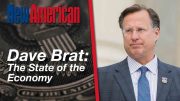
Almost as if a global memo had been sent out, headlines of major media outlets across the planet announced the unfolding of the coming “New World Order” — with a smaller role for the United States and freedom. A correspondingly larger role will be reserved for tyrannical governments like China and global economic management by international institutions, the news reports explained.
Even U.S. government-funded media outlets like Radio Free Europe/Radio Liberty used the term in an article headlined, “‘New World Order’ Emerging At G-20 Summit.” The article began: “A new world order is emerging at the G-20 Summit in Pittsburgh with a decision by the group to become the premier coordinating body on economic issues.” The story also noted that countries like China would be given “more of a voice in how the global economy is run.”
A separate article in the U.K.’s Telegraph, entitled “G20 to police new world economic order,” explained that the Communist nation and other developing countries would be given more voting power in the International Monetary Fund (IMF), a sort of planetary central bank regime that has played a large role in ushering in the new world order.
“Global leaders took their biggest steps yet toward a new world order that’s less U.S.-centric with a more heavily regulated financial industry and a greater role for international institutions and emerging markets,” explained a Bloomberg News report headlined “G-20 Shapes New World Order With Lesser Role for U.S., Markets.” Regarding the IMF, the article noted: “The G-20 also agreed to an allocation of $250 billion in Special Drawing Rights, the artificial currency that the IMF uses to settle accounts among its member nations. The move is akin to a central bank such as the Federal Reserve effectively creating money out of thin air, except it’s on a global scale.” A Reuters article, entitled “New world economic order takes shape at G20,” underscored the points. Hundreds of billions more will be provided to the IMF by governments.
The group also agreed to regulate some salaries in the private sector and crack down on tax havens. Additionally, it will continue “stimulating” the economy by throwing taxpayer money at government programs. It all sounds suspiciously similar to the old world order, only even more totalitarian.
Countless other headlines announced the new world order and its intentions as well. “Obama to Usher In New World Order at G-20,” was the title of an article by Fox News. An NBC report headline read: “New World Order: Obama to Widen G-20’s Role.” In Russia, Pravda ran a story entitled “G20 to Become Premier Coordinating Body in Global Economic Order,” while the Toronto Star in Canada published an opinion piece entitled “Changing power structure shapes a new world order.” An Associated Press article summed it up well: “Major world leaders formed themselves into a new board of directors for the global economy Friday.” Where they purport to obtain this authority from was not addressed.
And the assembled leaders invoked similar concepts throughout the week, even if they didn’t necessarily use the phrase “new world order.” British Prime Minister Gordon Brown announced: “The old system of international economic cooperation is over. The new system, as of today, has begun.” He also explained that the G-20 would become the “premier economic organization for dealing with economic management around the world.”
President Barack Obama advanced the tired excuse for world government (without calling it that) in his September 23 speech to the United Nations General Assembly, prior to attending the G-20 summit later in the week. “We have sought — in word and deed — a new era of engagement with the world,” he told the UN General Assembly. “Now is the time for all of us to take our share of responsibility for a global response to global challenges.” The “engagement” and “global response” Obama envisions would not be without teeth. He acknowledged that the United Nations “struggles to enforce its will, and to live up to the ideals of its founding.” But he added, “I believe that those imperfections are not a reason to walk away from this institution.” Indeed, later in his speech he effused that “we can be a generation that chooses to see the shoreline beyond the rough waters ahead; that comes together to serve the common interests of human beings, and finally gives meaning to the promise embedded in the name given to this institution: the United Nations.”
And Luiz Inacio, the radical leftist President of Brazil, called for a “world economic order” in his own speech to the UN General Assembly. “Because the global economy is interdependent, we are obliged to intervene across national borders and must therefore re-found the world economic order,” he was quoted as saying by AFP.
Photo of G-20 Pittsburgh Summit: AP Images
Related article:



